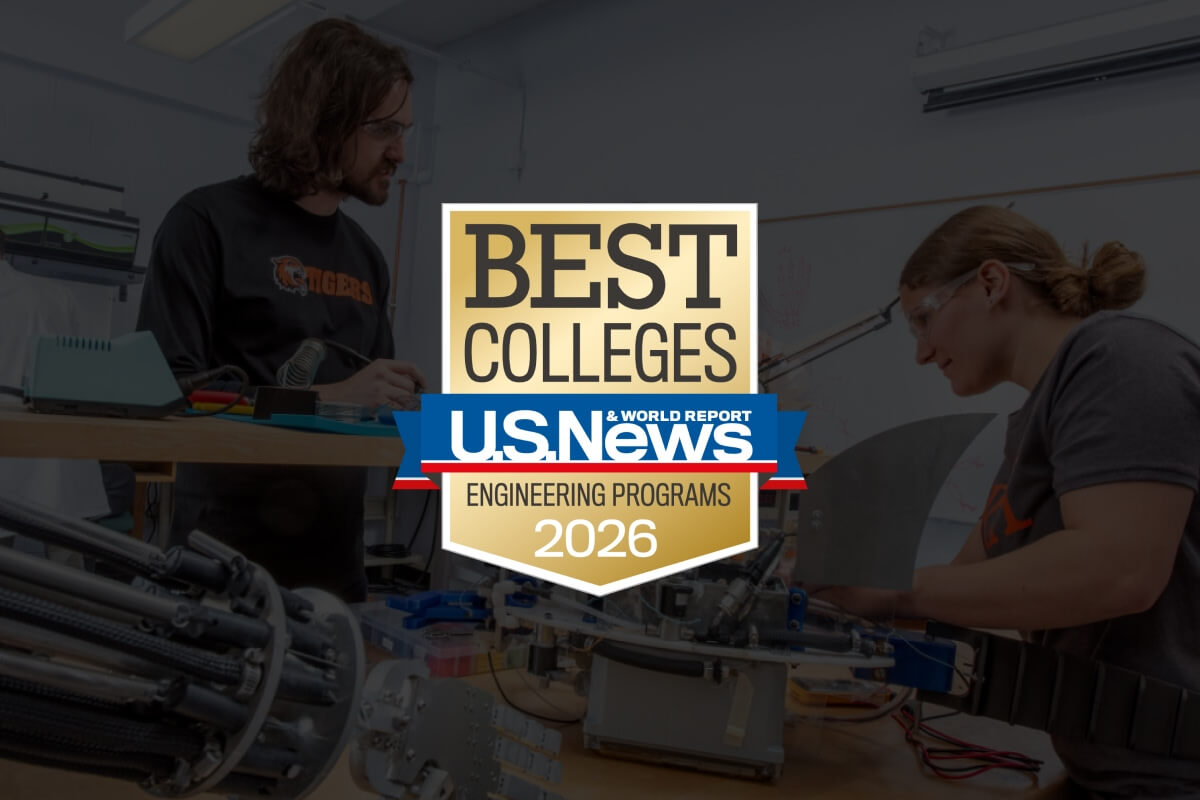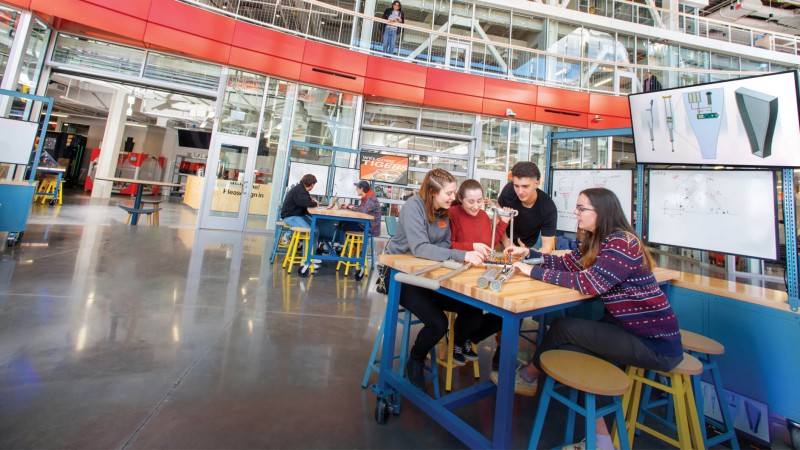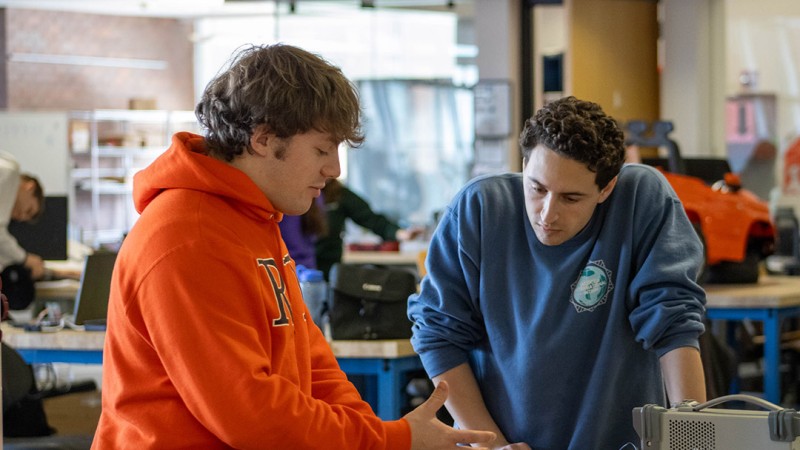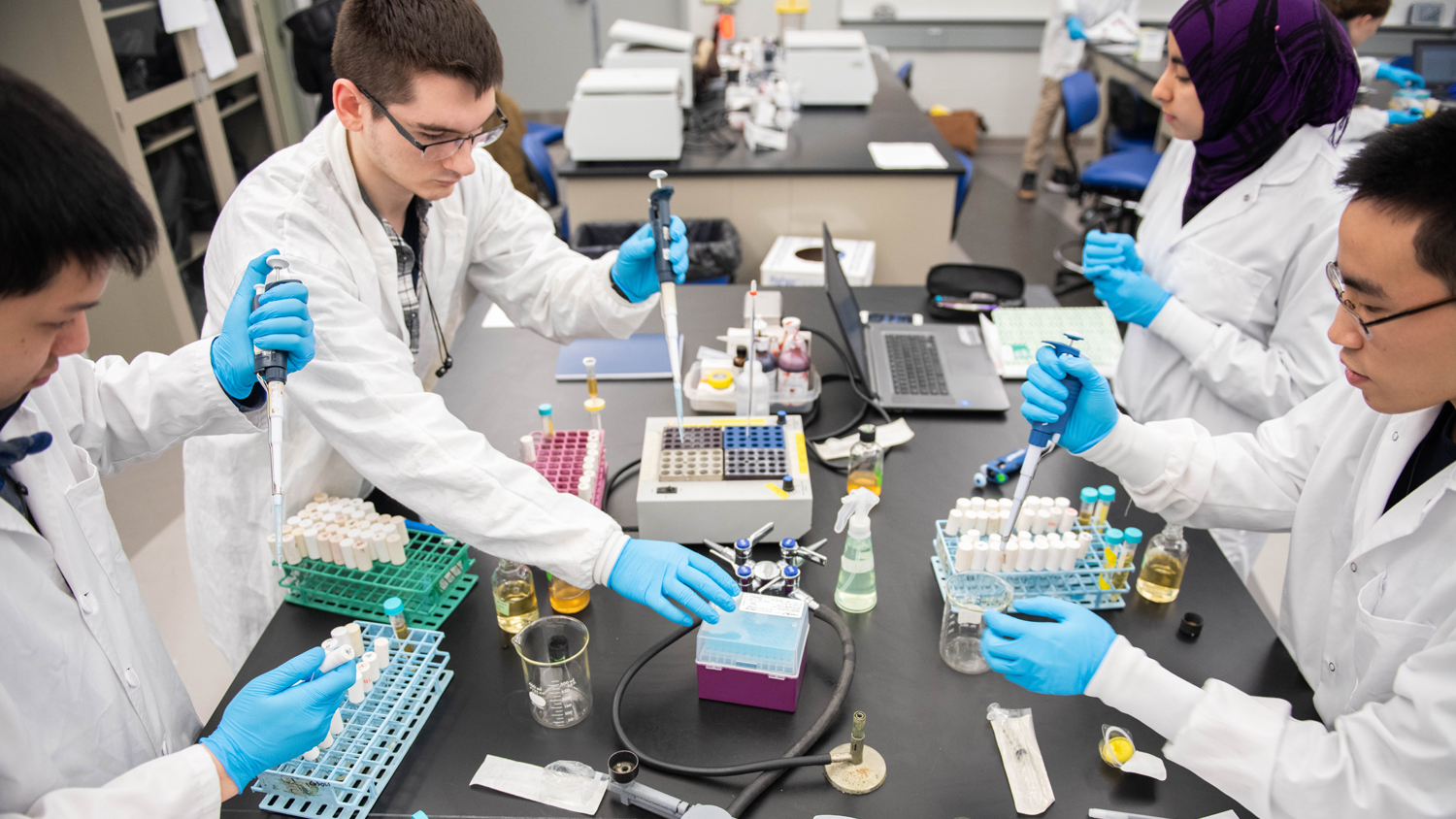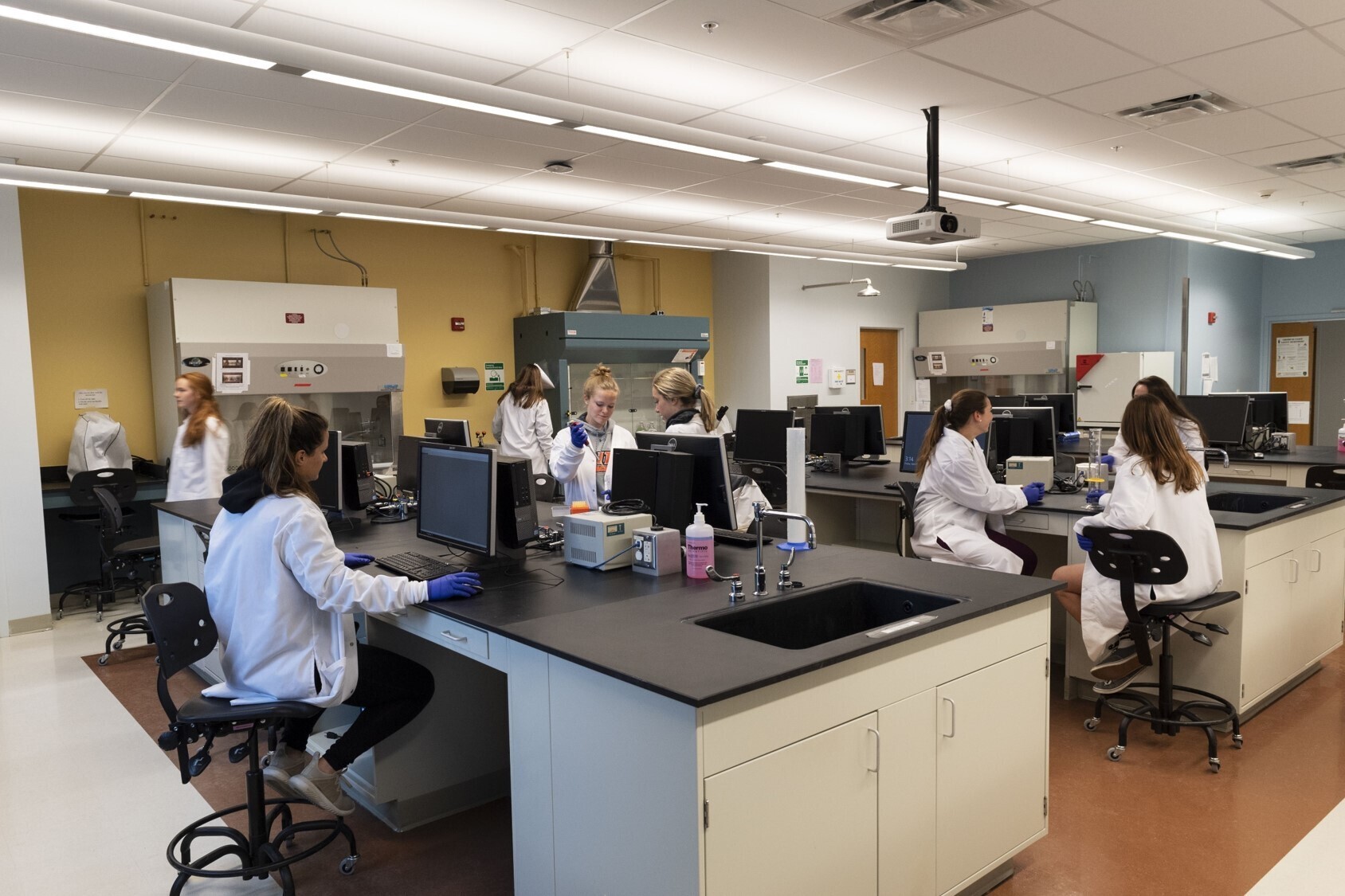Biomedical Engineering Bachelor of Science Degree
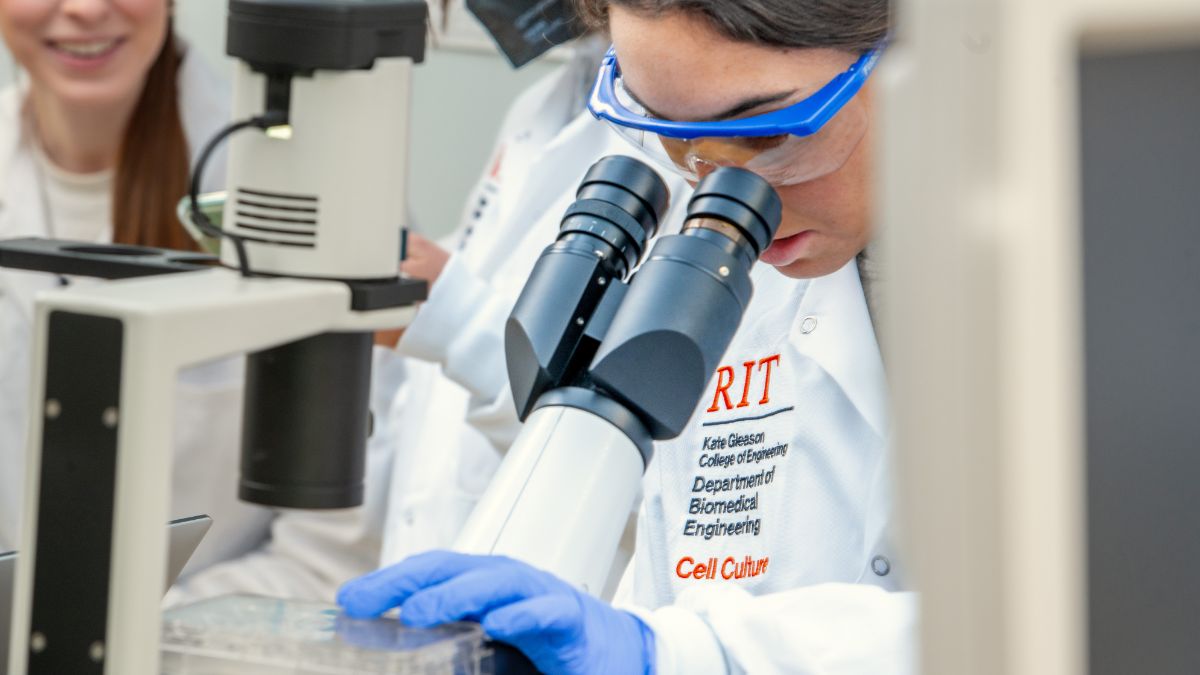
Biomedical Engineering
Bachelor of Science Degree
- RIT /
- Rochester Institute of Technology /
- Academics /
- Biomedical Engineering BS
Overview for Biomedical Engineering BS
Why Study RIT’s Bachelor’s Degree in Biomedical Engineering
Comprehensive Curriculum: A calculus-based engineering degree with foundational science that includes cell and molecular biology, human physiology, physics, and chemistry.
Gain Real-World Experience: Four blocks cooperative education offer opportunities to gain real-world experience through engineering co-ops.
Jobs at Industry-Leading Companies: Companies hiring our students for co-ops include Medtronic, Merck, Moderna, Bausch & Lomb, Bristol Myers Squibb, Corning, Hill-Rom, Johnson & Johnson, Ortho Clinical Diagnostics, Regeneron, and more.
Pre-Med/Pre-Health and Pre-Vet Advising Programs: Receive personalized guidance to become a competitive candidate for admission to medical and veterinary schools and graduate programs in the health professions.
Direct Path to Medical School: RIT’s partnership with the University of Buffalo’s Jacobs School of Medicine offers eligible pre-health/pre-med students early admission and mentorship through the Early Opportunity Program in Medicine.
Accelerated Bachelor’s/Master’s Available: Earn both your bachelor’s and your master’s in less time and with a cost savings, giving you a competitive advantage in your field.
STEM-OPT Visa Eligible: The STEM Optional Practical Training (OPT) program allows full-time, on-campus international students on an F-1 student visa to stay and work in the U.S. for up to three years after graduation.
Improving the health and well-being of others is the emphasis of this dynamic biomedical engineering BS. Biomedical engineering leverages the vast knowledge base of engineering, biology, and medicine to solve problems focused on health care and the human body. Biomedical engineers:
- Design instruments, devices, and software
- Bring together knowledge from many technical sources to develop new medical products, procedures, and pharmaceuticals
- Conduct research needed to solve clinical problems
Biomedical Engineering Courses
RIT’s biomedical engineering BS is a five-year program consisting of the following:
- Biomedical Engineering Core Courses: A core set of courses in science, technology, engineering, and mathematics (STEM) give you the ability to apply principles of science and engineering to analyze, model, design, and realize biomedical devices, systems, components, and processes. You will learn to solve biomedical engineering problems, including those associated with the interaction between living and non-living systems, as well as make measurements on, and interpret data from, living systems.
- Professional Technical Electives: Two free electives allow you to choose courses from any college in the university. In the fourth or fifth year of the program, students choose two technical electives specifically related to some aspect of biomedical engineering, such as biomechanics, instrumentation and imaging, or tissue engineering.
- Cooperative Education: One year of cooperative education experience provides you with hands-on experience working in industry. (See Cooperative Education below.)
- Liberal Arts Courses: Courses that include writing, communications, and the humanities and social sciences comprise liberal arts courses you will complete as part of your degree. A three-course immersion is also required. The immersion can enhance your biomedical engineering studies or be a topic that explores a personal interest.
- Free Electives: Chosen based on your interests, these free electives provide you with the opportunity to select additional course work to enhance a personal or professional interest.
- Multidisciplinary Senior Design: This two-course multidisciplinary senior design experience integrates engineering theory, principles, and processes within a collaborative environment that bridges engineering disciplines. Explore projects and innovations developed in multidisciplinary senior design.
Learn more about the Student Learning Outcomes and Program Educational Objectives for the biomedical engineering BS degree.
What’s the Difference Between Engineering and Engineering Technology?
It’s a question we’re asked all the time. While there are subtle differences in the course work between the two, choosing a major in engineering or engineering technology is more about identifying what you like to do and how you like to do it.
Furthering Your Education in Biomedical Engineering
RIT’s Combined Accelerated Bachelor’s/Master’s Degrees enable you to earn both a bachelor’s and a master’s degree in as little as five years, giving you a competitive advantage.
- Biomedical Engineering BS/Biomedical Engineering MS: In this combined accelerated biomedical engineering BS/MS pathway, you'll gain the skills to utilize technology, design, and engineering to positively impact human health and patient care, including how to develop biomedical systems and medical equipment and processes. This knowledge will give you the ability to contribute to innovations in medical technology, drug development, and regulatory compliance in academia, hospitals, laboratories, and manufacturing settings.
- Biomedical Engineering BS/Science, Technology and Public Policy MS: Throughout history, technology has been a major driver of social, political, and economic change. Societies around the globe employ public policies to solve problems and achieve their social, economic, and environmental objectives. The spheres of public policy and technology overlap as society is challenged to consider not only the role of new technologies in its quest for improved quality of life, but also how policies affect the development, emergence, and choice of new technologies. Because of the role engineers play in creating new technology, they increasingly have an important role in helping to shape public policy. Moreover, policies affecting how we as a society live and work—such as environmental, industrial, energy, and national security policy, to name a few—demand that engineers be prepared to integrate policy issues into their engineering practice. Biomedical engineering students may choose to pursue an accelerated dual degree in which they may complete a BS in biomedical engineering and an MS in science, technology, and public policy in approximately five years. Many biomedical engineers combine their technical knowledge with the policy skills needed to analyze and advocate for policy change in both private and public organizations. The interdisciplinary nature of the program, in conjunction with the quantitative and qualitative approaches taken to understand and analyze policy, will contribute to your ability to gain exciting leadership roles in a range of engineering fields.
- Biomedical Engineering BS/Industrial and Systems Engineering MS: In this accelerated dual degree pathway you will earn both a BS in biomedical engineering and an MS in industrial and systems engineering. Students with an interest in biomedical products and services will acquire the skills to optimize, design, manage, and innovate the operational, manufacturing, and decision-making processes necessary to produce and distribute goods and services effectively and efficiently. Gain a comprehensive understanding of modern solutions to challenges in services, manufacturing, product development, and systems design. The training places a strong emphasis on data-driven decision-making solutions, combining engineering, business insights, mathematics, data analytics, and systems perspective to design solutions for complex problems.
Pre-Med/Pre-Health Advising
RIT’s Office of Pre-Health Advising offers an advising program that’s open to all majors and provides personal, individualized academic counseling to help you create a comprehensive long-term strategy to assist you in building successful applications to medical, dental, and veterinary schools or graduate degrees in the health professions (e.g., occupational therapy, physical therapy, etc.). Our pre-health advisors will have in-depth conversations with you around critical topics that include academic planning and course selection, MCAT and other admission exams, undergraduate research opportunities, clinical experiences and field work, timelines, and much more. Learn more about pre-med/pre-health advising.
Pre-Vet Advising
RIT’s pre-vet advising program provides personalized support to help you prepare successful applications for veterinary medical school. Pre-vet advising offers guidance on course selection, veterinary and animal care experience requirements, the veterinary school application process, and more. Learn about RIT’s pre-vet advising program.
RIT/University of Buffalo’s Early Opportunity Program in Medicine
RIT pre-health/pre-med students have a direct path to medical school through an RIT partnership with the Jacobs School of Medicine and Biomedical Sciences at the University at Buffalo (UB). The Early Opportunity Program in Medicine allows eligible RIT students to secure a pre-admission offer to the Jacobs School while completing their undergraduate degree at RIT. Students accepted into the program gain early access to professional training and mentorship at UB’s medical school, helping them prepare for the demands of medical school and beyond. Learn more about the Early Opportunity Program in Medicine.
-
#57 Best Engineering Undergraduate Programs, 2026
RIT’s engineering majors are ranked among the Best Undergraduate Engineering Programs in the nation.
-
Join Us for Accepted Student Open House
Visit campus on March 28 or April 11 to meet faculty, tour campus, and ask your questions.
-
Join us for Fall 2026
There's still time to apply. For some programs, applications will be reviewed on a rolling, space-available basis.
Careers and Cooperative Education
Typical Job Titles
| Biomedical Engineer | Bioprocess Engineer | Process Development Engineer |
| Project Engineer | Project Manager | Quality Engineer |
| Research & Development Engineer | Research & Development Scientist | Systems Engineer |
Industries
-
Biotech and Life Sciences
-
Pharmaceuticals
-
Medical Devices
-
Health Care
-
Scientific and Technical Consulting
-
Government (Local, State, Federal)
Cooperative Education
What’s different about an RIT education? It’s the career experience you gain by completing cooperative education and internships with top companies in every single industry. You’ll earn more than a degree. You’ll gain real-world career experience that sets you apart. It’s exposure–early and often–to a variety of professional work environments, career paths, and industries.
Co-ops and internships take your knowledge and turn it into know-how. Your engineering co-ops will provide hands-on experience that enables you to apply your engineering knowledge in professional settings while you make valuable connections between classwork and real-world applications.
The biomedical engineering degree requires students to complete four blocks (roughly 48 weeks) of cooperative education.
Featured Work and Profiles
-
What's Being Made in the SHED
Making at RIT has hit a new level now that several makerspaces in the Student Hall for Exploration and Development (SHED) have opened. Learn what's being created.
Read More about What's Being Made in the SHED -
RIT Grad Heads to UK to Revolutionize Prosthetic Engineering
Biomedical engineering graduate Maggie Brooks embarks on a Fulbright journey to the University of Southampton, aiming to enhance prosthetic care through a holistic, patient-centered approach.
Read More about RIT Grad Heads to UK to Revolutionize Prosthetic Engineering -
Mikkael Lamoca Receives Fulbright Award for Pioneering Neuroprotection Research
Mikkael Lamoca '24, a biomedical engineering and public policy graduate, is set to advance his groundbreaking research on neuroprotection using magnetic stimulation as a Fulbright U.S. Student awardee...
Read More about Mikkael Lamoca Receives Fulbright Award for Pioneering Neuroprotection Research -
Student Leads Team to Develop Innovative Blood Pressure Cuff with Improved Accuracy
Biomedical engineering student Aidan Hughes and his team at RIT are designing a new automatic blood pressure cuff that uses stethoscope-like listening techniques for more precise measurements,...
Read More about Student Leads Team to Develop Innovative Blood Pressure Cuff with Improved Accuracy -
Biomedical engineering students help advance digital microscope technology
Biomedical engineering majors Brandon Buscaglia and Marcus D’Aguiar are two examples of how engineering and medicine can be successfully bridged to help create solutions that advance both science,...
Read More about Biomedical engineering students help advance digital microscope technology
Curriculum for 2025-2026 for Biomedical Engineering BS
Current Students: See Curriculum Requirements
Admissions and Financial Aid
This program is STEM designated when studying on campus and full time.
First-Year Admission
First-year applicants are expected to demonstrate a strong academic background that includes:
- 4 years of English
- 3 years of social studies and/or history
- 4 years of math is required and must include algebra, geometry, algebra 2/trigonometry, and pre-calculus. Calculus is preferred.
- 2-3 years of science. Biology, chemistry, and physics are required.
Transfer Admission
Transfer applicants should meet these minimum degree-specific requirements:
- A minimum of pre-calculus is required. Calculus is preferred.
- Chemistry or physics is required.
- Biology is required.
Financial Aid and Scholarships
100% of all incoming first-year and transfer students receive aid.
RIT’s personalized and comprehensive financial aid program includes scholarships, grants, loans, and campus employment programs. When all these are put to work, your actual cost may be much lower than the published estimated cost of attendance.
Learn more about financial aid and scholarships
Accreditation
Research
The faculty and students in the Kate Gleason College of Engineering are engaging in numerous areas of research, which takes place across all of our engineering disciplines and often involves other colleges at RIT, local health care institutions, and major industry partners. Explore the college's key research initiatives to learn more about our research in:
Related News
-
November 19, 2025

Venture Creations startup company is redefining breast cancer detection
BiRed Imaging, co-founded by Professor Satish Kandlikar, blends infrared camera capture, numerical simulation, and artificial intelligence-driven algorithms to accurately detect the presence, size, and location of tumors. The revolutionary process spares patients painful breast compression, radiation exposure, false alarms, and unnecessary anxiety.
-
May 27, 2025

Thirteen seniors at partner high school headed to RIT
RIT’s partnership with Rochester Prep High School celebrated its 10-year anniversary.
-
May 14, 2025
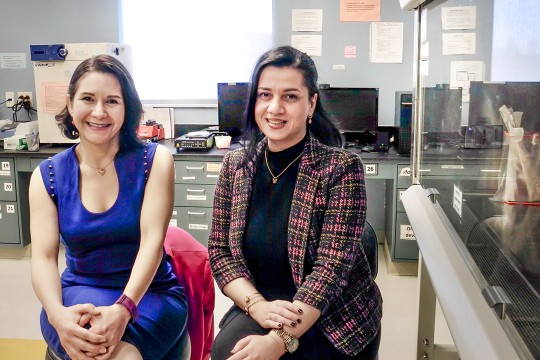
New separation technique will improve lab-on-chip devices
Using a non-traditional, micro-organism separation method, researchers at RIT discovered a faster technique that can be used to distinguish cells that are resistant to antibiotics or cancer.
Contact
- Jennifer Bailey
- Undergraduate Program Director
- Department of Biomedical Engineering
- Kate Gleason College of Engineering
- 585‑475‑4964
- jlbbme@rit.edu
Department of Biomedical Engineering










